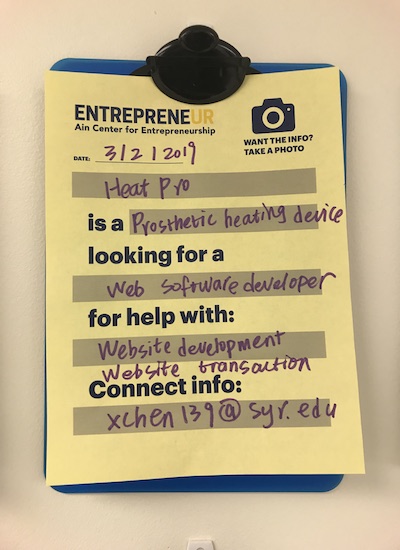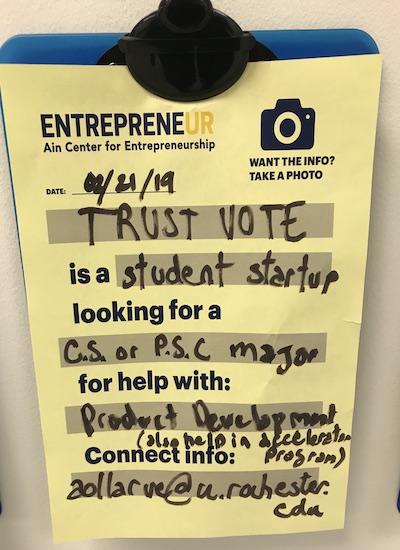Highlights from Harvard Social Enterprise Conference – and How You Can Attend Next Year
By Maria Connolly
Picture this: It’s 6 pm, you’re sitting on the inflatable couch you just dropped $50 on and you’re contemplating which of the million assignments due that week you should begin. But all of a sudden you get an email that reads: “if interested in attending the Harvard Social Enterprise Conference fill out this google form.” What do you do?
- Ignore it and take a nap, it’s already dark out
- Think, maybe I shouldn’t have bought this couch…eh there’s no way I’m going to be accepted *deletes email*
- Do homework and maybe reopen the email later
- Stop everything and fill that form out! Tell your friends that may be interested! Research more about the conference! Get hyped – it might be your first time in Boston. You’ll get to network with social innovators and learn about social enterprises!
I think it’s safe to say I chose option 4.

This past weekend (March 2nd-3rd) I had the privilege of attending the 20th Annual Social Enterprise Conference (SECON) at Harvard with five other University of Rochester students. For those who aren’t familiar, social enterprises are organizations focused on benefitting society and or the environment while working to maximize profits.

The University of Rochester attendees (from left to right: Vanshika, Youssef, Hector, Reed, Mazen, and Maria).
Before jumping into the insightful keynotes around social enterprise, passionate discussions, panels and networking we had the opportunity to do some sightseeing. We enjoyed exploring Harvard square, touring Tufts University, and networking with professors at MIT.

Harvard Square.

Outside the MIT Library.

Inside the MIT Library.
After a day of walking around, we went back to the hotel and prepared for the conference the next morning, researching the different speakers and events we wanted to attend. Below are my key takeaways from a couple of events I attended, broken down by day.
Day 1:
“Achieving Scale: Lessons from BRAC”
- Create employment for members of the community you’re trying to help
- Put profit back into the community
- Key factors for BRAC’s Success included: the founder’s leadership & business acumen, securing broad-based funding, continued testing & learning, knowledge of culture & cultural sensitivity, and the ability to navigate a changing political environment
[A note on networking: The time right before events began and the portion of the conference dedicated to networking were perfect times to put this year’s theme of “Unlikely Allies: Forging Partnerships for Progress” into practice.
For those of you who aren’t the biggest fans of networking, if the conference has an app such as “Attendify” (see my page to the right) take advantage of it! Post a bio about yourself and private message people you would love to talk to and schedule time to meet during lunch. It’s a less nerve-wracking but effective approach. Be sure to add them on LinkedIn!]

Day 2:
“Pitch Competition”
- Presenters were extremely prepared and confident, presenting their business ideas in five minutes without notes
- Many questions that were asked were about the future of their companies/ideas in which the presenters immediately had answers for
“How to Innovate for Radically Greater Social Good”
- Think Big. Start Small. Seek Impact.
- There’s a rush for companies to deliver impact but in order to successfully innovate for greater social good, Ann Mei Chang (author and advocate for social innovation) suggested the following:
- Starting small will lead to a bigger difference over time
- Experiment & improve faster
- Avoid spending time and money on failing big
- Learn by doing because learning is “failing small”
- Social Innovation is the intersection between value, impact, and growth
- Value – Is there a demand for what you have to offer?
- Listen to users from the beginning, ask more pointed questions if there isn’t a correlation between behaviors and users answers on surveys
- Impact – Does it work/deliver impact?
- Seeing if your product is being used is a precursor of impact to determine if you’re on track
- Growth – Will it scale?
- Alcoholics Anonymous is a great example of an organization that’s scaled through the distribution of guidelines and steps in a book
- Value – Is there a demand for what you have to offer?

Views from the Harvard Bridge.

The group outside of Tufts University.
I’d like to thank Meliora LaunchPad for the opportunity to attend this conference and the University of Rochester for funding our travel and stay.
If you’re interested in attending next year, simply attend events hosted by Meliora LaunchPad, introduce yourself to the e-board and express interest. Pro-tip: the earlier you sign up the cheaper the tickets. Best of luck!
Maria Connolly ’19 is a Brain and Cognitive Sciences major at the University of Rochester, where she also pursues interests in marketing and photography. She was selected as a BASTA Fellow in January 2019, where she participates in a rigorous career prep program designed for first-generation college students. Maria also supports her fellow student entrepreneurs by working in the Ain Center for Entrepreneurship.




